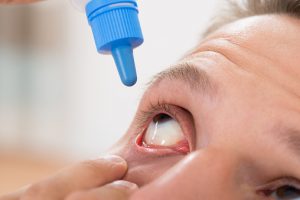 Dry eyes are linked to air pollution, decreased humidity, and increased ozone levels. The study looked at data taken from 16,824 participants in South Korea. Dry eye disease was defined as the presence of eye pain and discomfort, along with the feeling of dryness and irritation. Outdoor air pollution measurements were collected from 283 national monitoring stations.
Dry eyes are linked to air pollution, decreased humidity, and increased ozone levels. The study looked at data taken from 16,824 participants in South Korea. Dry eye disease was defined as the presence of eye pain and discomfort, along with the feeling of dryness and irritation. Outdoor air pollution measurements were collected from 283 national monitoring stations.
The researchers found that a decrease in humidity and increased ozone levels were associated with dry eye disease, even after controlling for other risk factors for the condition. “These results, however, are just associations and do not definitively indicate a cause-and-effect relationship between DED [dry eye disease] and outdoor air pollution,” said researcher Dong Hyun Kim.
Dry eye syndrome risk increases with high levels of air pollution: Previous study
Advertisement
A previous study found higher rates of dry eye syndrome in the major – and highly-polluted – cities in the U.S. The participants in and around Chicago and New York cities had a three to four times greater risk of dry eye syndrome diagnosis, compared to participants in less urbanized areas.
Lead researcher Dr. Anat Galor said, “Undoubtedly, many people living in arid and polluted cities would readily attest to the irritating effect air pollution has on dry eye. Our research suggests that simple actions, such as maintaining the appropriate humidity indoors and using a high-quality air filter, should be considered as part of the overall management of patients suffering from dry eye syndrome.”
Natural and home remedies for dry eyes
Dry eye symptoms can be annoying and interfere with your life. Here are some home remedies that can help ease your dry eye symptoms:
Apply warm compress: Because dry eyes can occur due to lack of tears, applying a warm compress may unclog your tear glands, allowing the production of tears and relieving dry eye symptoms.
Clean your eyes: Using a gentle soap – like baby soap – clean your eyes carefully. This can help remove any irritants and keep your eyes feeling hydrated and fresh.
Blink: Our bodies naturally lubricate our eyes through blinking. Make sure you are blinking often, especially when concentrating on a computer screen or sitting in front of a TV. Blinking can also help remove dust and debris from your eyes and prevent irritation.
Wear protective eye gear: Sunglasses are an easy solution to your dry eye problem because they can block the sunlight and the wind – both dry eye causes.
Stay hydrated: Because our bodies require water for all major functions, it’s no surprise that drinking enough water is a dry eye treatment. In particular, on hotter days, make sure you’re getting adequate hydration, and if you find water boring, add in fruits and vegetables.
Check with a doctor about medication: If medication is the culprit, check with your doctor to see if there is an alternative treatment available.
Advertisement
Apply cucumbers: Because of their water content, placing cucumbers on the eyes can keep them moist and lubricated – an effective dry eyes home remedy indeed.
Reduce coffee consumption: Coffee can worsen your dry eye condition, so cutting back on your intake may help relieve dry eye symptoms.
Stop smoking: Smoking, or being around smoke, can make dry eye symptoms worse. If you’re a smoker, make plans to quit, and try to avoid any smoke-ridden environment.
